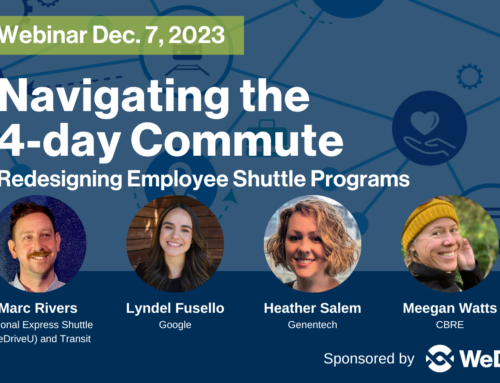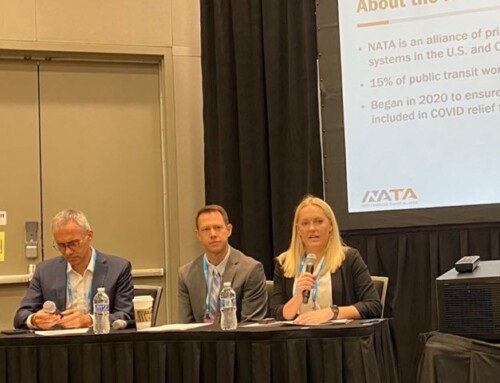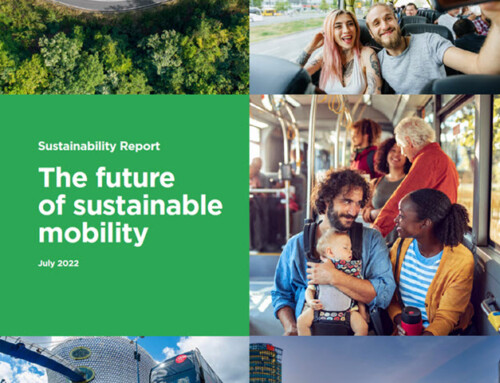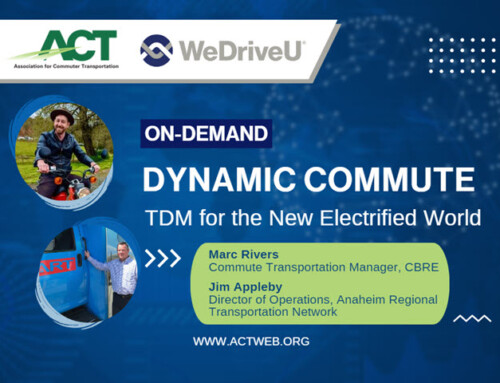Improving the Journey to Work: 3 Cs for Success
Why we need more efficient and effective transportation – a guest post by ACT’s David Straus.

A special thanks to David for sharing his insights on new approaches to benefit “commuters, communities and companies” in this excerpt from his article published on “Meeting of the Minds.”
Every day an estimated 130 million Americans travel to jobs located in dense urban centers, suburban office parks, and rural communities. The choices these individuals make on how they commute are influenced not only by the convenience and affordability of transportation options but are also often influenced by decisions made at the state, local, and federal level that have for decades focused on the creation, expansion, and maintenance of our road infrastructure. Focus on infrastructure rather than transportation has resulted in policies that lend to a culture of the solo-commute. The result is that a vast majority of commuters drive alone to work in personal vehicles. This over dependence on the single occupancy vehicle has led to chocking congestion in communities large and small that has a direct impact on economic activity and growth, not to mention a degraded quality of life. Thus, the negative impacts of a series of individual and governmental decisions affect us all and reverberate throughout our economy.
Changing our priorities to reflect an increased focus on people rather than vehicles is critical. It is not cars that are late for work or miss their child’s recital at school, it is people. This does not mean we must abandon efforts to maintain and grow our transportation network. On the contrary – we need a more comprehensive strategy at federal, state, and local levels to address both infrastructure and transportation.
Changing our priorities to reflect an increased focus on people rather than vehicles is critical. It is not cars that are late for work or miss their child’s recital at school, it is people.
According to the Texas Transportation Institute, the average delay in travel time for each commuting driver in the top 100 metro regions of the United State is now 52 hours per year. This is time away from family and lost economic productivity. Congestion costs Americans $124 billion annually and is predicted to increase to $186 billion by 2030, when the annual cost of congestion will cost each American $2,300/year
Many communities and employers across the country have invested in Transportation Demand Management (TDM) programs aimed at encouraging drive-alone commuters to use public transit, carpooling, vanpooling, teleworking, biking, and walking. However, in order to reduce the nation’s drive alone rate and mitigate the negative impacts of single-occupancy vehicles, we must start thinking differently about the programs, policies, and transportation services we provide.
Many communities and employers across the country have invested in Transportation Demand Management (TDM) programs aimed at encouraging drive-alone commuters to use public transit, carpooling, vanpooling, teleworking, biking, and walking.
The Association for Commuter Transportation (ACT), the nation’s leading advocate for TDM programs and policies that support commuters, encourages communities and employers to think smarter about creating a more efficient and effective transportation system that uses our existing networks more efficiently.
Taking Action
How will public practices and business models clear the path for new services? Read David’s recommendations in the full article on the “Meeting of the Minds” blog.
Follow David on Twitter at @DavidAStraus. Follow ACT at @ACTNational.
Meet David and learn more about this topic at these events. For details and registration: http://actweb.org.
- ACT 2017 Public Policy Forum in Washington, D.C. April 19-21, 2017
- ACT 2017 International Conference in New Orleans, LA July 30-Aug. 2, 2017
- ACT TDM Forum in Las Vegas, Oct. 17-18, 2017
 About the author: David Straus is Executive Director of the Association for Commuter Transportation, an international organizational advancing progressive transportation demand management programs and policies that aim to improve the lives of commuters, the livability of communities, and economic growth of businesses.
About the author: David Straus is Executive Director of the Association for Commuter Transportation, an international organizational advancing progressive transportation demand management programs and policies that aim to improve the lives of commuters, the livability of communities, and economic growth of businesses.





